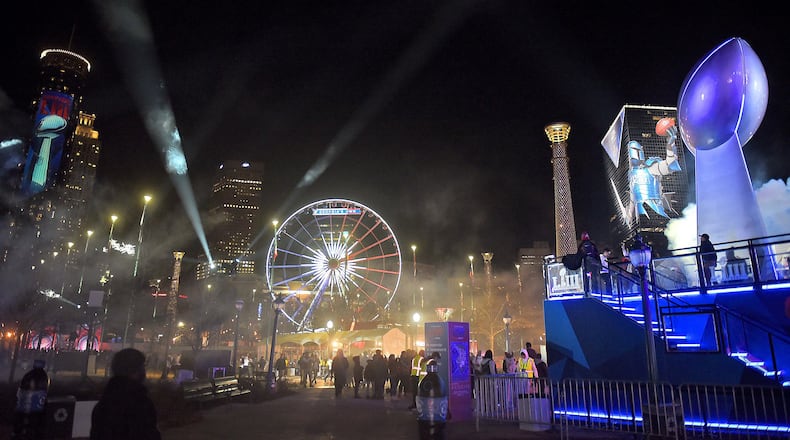The two biggest words in Atlanta over the next few days represent a pot of gold and a minefield for local businesses: Super Bowl.
Many including behemoths like Coca-Cola appear to be avoiding the words entirely. The NFL has a history of smacking non-sponsor companies that it believes infringe on the lucrative trademark of its biggest show.
Others are making it clear they are talking about That Game without technically saying it. An online posting for the Atlanta Food Truck Park & Market on Howell Mill Road promoted the “Souper Bowl Village.” Another for a watch party at midtown’s Park Tavern referred to “Sooper Bowl 53.”
Then there are the businesses that aren’t sweating it and instead coming right out and saying “Super Bowl” — everything from watch parties and a lingerie show to limousine services and a nude “sip and paint.”
There’s a lot of money to be made. Nearly three-fourths of U.S. adults are expected to watch the game, including 13 million of them in bars, according to the National Retail Federation. Total consumer spending tied to the Super Bowl is projected to reach $14.8 billion, including food, team apparel, decorations and more.
There isn’t any gray area for counterfeiters who use NFL or team names to try to sell fake tickets or unlicensed merchandise. This week, the NFL, the Los Angeles Rams and the New England Patriots filed a preemptive lawsuit in Fulton County against as-yet-unknown people who try to sell counterfeit tickets and unlicensed gear. The suit, like ones the NFL has pursued before every recent Super Bowl, aims to make it easier to quickly confiscate the goods and shut down operators trying to make a big score on the Big Game.
Big companies with big pockets also are treading lightly. A media advisory about DirecTV's "Super Saturday Night" concert at Atlantic Station said the event is scheduled the day before "professional football's championship game." Coke isn't saying Super Bowl because rival PepsiCo is the official sponsor. Home Depot's signage near Mercedes-Benz Stadium is being covered while signs will go up for competitor Lowe's, which also paid the NFL for the rights to use the term.
“Be careful,” said Amanda Hyland, an Atlanta trademark attorney at Taylor English who tells clients to skip the phrase “Super Bowl.”
“We advise them to get a little creative in how they are going to describe an event,” she added. “The entire industry is affected by this: hotels, night clubs, limousine services.”
The NFL has been an aggressive enforcer in the past as it tries to protect the value of rights that sponsors have paid for, she said. The league took heat more than a decade ago when it went after a church that planned to charge admission to a "Super Bowl bash" that was to be shown on a big screen.
It even has pushed back against some riffs on the Super Bowl name in past years. It successfully fought an attempt by an Arizona company to trademark the name "Superb Owl" for a series of running events (comedian Stephen Colbert famously did a bit tied to the name). The league also in the past has gone after a soup maker's case for "Souper Bowl" and another outfit's attempt to trademark "Superbowling Spectacular." The NFL has some rights to "Super Sunday," but not "Super Sundae," an ice cream trademark.
The league’s thinking may have shifted a bit in the intervening years. NFL spokesman Brian McCarthy said it looks at issues on a case-by-case basis and that churches and restaurants and bars having Super Bowl watch parties are generally fine as long as they don’t attempt to make it look like they have some official standing.
“We would want to see what it looks like,” McCarthy said. He added he wasn’t aware of the NFL sending any cease-and-desist letters to local businesses as of Tuesday.
Some area businesses are embracing the Super Bowl name. Action Limousines has promoted its “Super Bowl limo party bus” service and described itself as “Atlanta’s professional Super Bowl transportation provider” online.
Tammy Carlisle, Action’s sales vice president, said the company was careful not to use NFL-related images or the word “official.” She said she thought about using a different phrase to describe the game, “but who searched for ‘Big Game limo’?”
Competitors went farther. Hennessy Transportation, for example, stated online that “we bring you the ultimate Super Bowl experience direct from the NFL. Through our partnership, we provide official access to be as close as it gets on gameday.” Hennessy did not return a call seeking comment.
Some uses of the Super Bowl name could be clear-cut violations while others might depend on what company is doing the promoting, said Tim Holbrook, an Emory University professor who specializes in intellectual property law. Limited descriptive uses, such as those news reporters might use, are OK, he said.
A gathering at Club 112 Megaplex in Atlanta was being promoted as an “Official Super Bowl Watch Party,” with admission starting at $30 and plans for an after-game event. Its marketing included an image of what looks like the NFL’s official icon for the game.
Holbrook said that kind of promotion “would be dangerous if they do not have permission from the NFL.”
One of the gathering’s organizers, who identified herself as Ashley Foster from North Carolina, said use of the Super Bowl name was proper, though she said it hasn’t helped sell tickets. The NFL’s official icon was inadvertent, she said.
“I’m part of the Super Bowl committee, so I didn’t think the Super Bowl would mind,” she said. She clarified that she is one of 10,000 volunteers and that her duties included handing out flyers.
About the Author
The Latest
Featured




